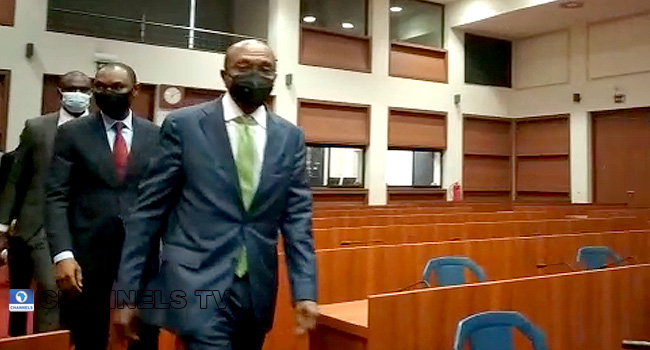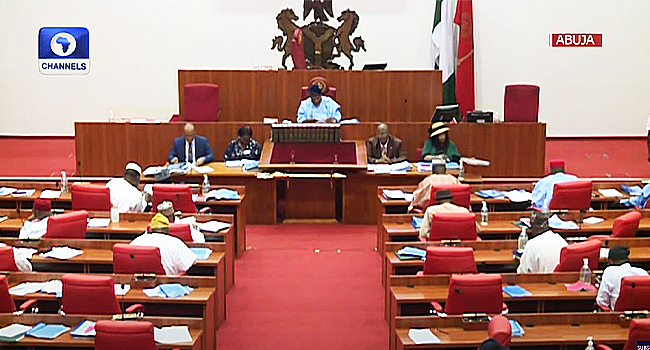The CBN Governor, Godwin Emefiele has arrived at the National Assembly to honour the request by the Senate Joint Committee on Banking Insurance and other financial institutions, (including ICT and cybercrime) to brief on the opportunities and threats of cryptocurrency on the nation’s economy.
The decision by the Senate to invite the CBN governor is sequel to a motion by a federal lawmaker, Senator Istifanus Gyang during plenary on February 11, on the CBN’s directive to stop financial institutions from transactions in cryptocurrencies and matters arising from them.

The federal lawmakers called for caution, pointing out that while cryptocurrency has its negative sides and it has become the fastest-growing form of transaction all over the world.
They argued that technology has changed the way business is conducted in Nigeria and the country cannot run away from cryptocurrency.
But the CBN Governor during his appearance today, pointed out that the bank is not in a popularity complex and its actions are welcomed by all Nigerians with nothing to hide.
He affirmed the banks’ commitment to protecting all actors in the financial space especially the uninformed.
According to him money laundering, terrorism financing, and other nefarious activities are being carried out using cryptocurrencies and the opacity of financial dealings using cryptocurrencies threaten the soundness of Nigeria’s financial institutions.
Present at the meeting was the Director-General of the Securities and Exchange Commission, chairman of the ICPC, and the chairman of the NFIU.
All agencies present were in support of the CBN ban on accounts engaging in cryptocurrency transactions, they also cited how opaque and unregulatable cryptocurrency transactions are.
It would be recalled that the CBN had on February 5, ordered all banks to close accounts of anyone who transacts in cryptocurrency.
The order was contained in a circular to banks and other financial institutions, signed on Friday by the Director of Banking Supervision, Bello Hassan, and it is expected to take effect immediately.
According to the CBN, dealing in cryptocurrency or facilitating payments for cryptocurrency exchanges is prohibited.
READ ALSO: Use Of Cryptocurrency Illegal In Nigeria, Says CBN
“The Central Bank of Nigeria circular of January 12, 2017, ref FPR/DIR/GEN/CIR/06/010 which cautioned Deposit Money Banks (DMBs), Non-Bank Financial Institutions (NBFIs), other Financial Institutions and members of the public on the risk associated with transactions in cryptocurrency refers,” the statement said.
“Further to earlier regulatory directions on the subject, the bank hereby wishes to remind regulated institutions dealing in cryptocurrencies or facilitating payments for cryptocurrency exchanges is prohibited.
“Accordingly, all DMB’s NBFI’s or OFI’s are directed to identify persons and/or entities transacting in or operating cryptocurrency exchanges within their systems and ensure that such accounts are closed immediately.
“Please, note that breaches of this directive will attract severe regulatory sanctions. This letter is with immediate effect”.
The CBN further noted that the use of cryptocurrencies in Nigeria contravenes existing laws.
The apex bank warned Deposit Money Banks (DMBs) to desist from transacting cryptocurrencies and dealing with entities who do the same.
According to the CBN, cryptocurrencies are “issued by unknown and unregulated entities” and are increasingly being used to conduct ” many illegal activities including money laundering, terrorism financing, purchase of small arms and light weapons, and tax evasion.”




